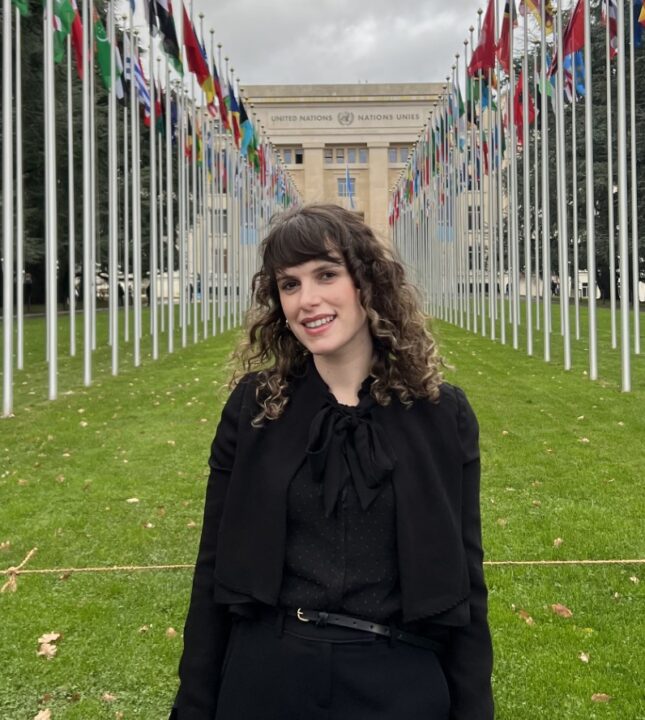Travels in Pursuit of Biological Security

Finding time to interview Alexandra Klein was challenging, what with her traveling between London, where she is pursuing her PhD, and Geneva, where she has been attending meetings for the Biological Weapons Convention. Travel is not new for Klein, who was an undergraduate student at the University of Birmingham in the UK, an Amgen Scholar at LMU in Germany, and whose research has taken her across the UK, as well as to Sweden and France.
Klein’s travels have all been in the pursuit of science and public policy — working to understand how governments can prepare and make policy for biological threats, and how they make decisions under deep uncertainty. Klein recently won a competition run by the Nuclear Threat Initiative, which is what gave her a spot to present her work at a United Nations annual meeting for strengthening the Biological Weapons Convention.
“It has been so interesting to see international diplomacy in action, and to be in the room watching diplomats discuss the important issues that my research focuses on,” Klein says. “It was an amazing experience to present along with my two teammates for the project and share our work with diplomats from around the world.”
Klein’s passion for science began at a young age. She remembers hearing her father, who was a doctor working in public health, being interviewed on the news during the SARS outbreak in China. “I realized he was doing a job that could really make a difference,” she says.
At school, her enthusiasm for science grew with support from outstanding teachers in biology and physics who helped make the topics feel accessible. When considering her undergraduate program, Klein wanted to make sure she could couple her love of science with her love of literature, and so chose a natural science major that enabled her to build her own degree program at the University of Birmingham. “I saw I could still use creativity and imagination in science too, and in fact many of the best scientists were very creative, interesting people,” she says.
For her Amgen Scholars summer at LMU in 2016, Klein worked in a lab studying a protozoa, Trypanosoma brucei, which causes “sleeping sickness” in Africa. “I was so grateful for the opportunity to live in a new country for two months and to be in a leading lab at LMU whilst spending the weekends exploring Munich with the other scholars,” she says. Klein calls the poster session at the Europe Amgen Scholars symposium in Cambridge–where she returned last year as an alumni speaker–”truly life-changing.” The session cemented her interest in graduate school, specifically at the University of Cambridge. She would go on to receive a scholarship to pursue a master’s degree at St. John’s College in Cambridge, also studying trypanosomes.
“I still remember calling my family to tell them after I received an email [of acceptance to St. John’s] while I was on the train, and hearing them scream down the phone in excitement, and then I lost the phone signal and it cut out,” she recalls. “I am sure the reason the interview went well was because I had a great supervisor during the Amgen Scholars Program who always explained everything very patiently in detail to me, and that helped me to effortlessly describe the science behind my summer project.”
Between that master’s program and her current PhD program at University College London, Klein participated in an Erasmus+ graduate traineeship in Paris at the Institut Curie in scientific writing and worked at the Royal Society of Chemistry in scientific publishing. Now in her second year of her PhD, she is excited to be combining her research background and science communications experience in the pursuit of public health policy work. After the COVID-19 pandemic, she felt particularly driven to work on issues related to “biological security.”
Although Klein did not stay in lab research, she says her Amgen Scholars summer gave her invaluable skills. “The most useful skills came from the experience of arriving in a new country and different culture for a two-month internship – this meant that I had to quickly adapt and get to grips with the new environment and the project, as well as quickly learning new lab techniques and skills,” she says. “This experience has helped me to quickly assimilate in new research projects and jobs.”
Returning to Cambridge to connect with the new cohort of Amgen Scholars last year was fulfilling. “I remembered exactly how I felt when I came there years ago, excited to give my first poster presentation,” she says. “As an alumni speaker, it was so nice to meet all the enthusiastic, ambitious young people and tell them about my career path so far.”

